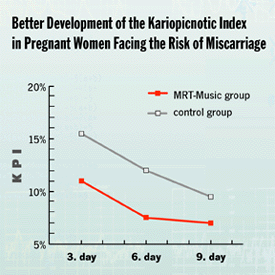The reasons for the danger reached from environmentally caused stress situations over nervous mental tensions up to hormonal deficiencies.
We built two groups, an experimental group and a control group. In the first two days all patients of both groups underwent complex hormonal investigations and next to other parameters also the kariopicnotic hormone index was determined.
On average the patients were 23 years old (± 3,1). For seven of the women it was their first pregnancy, eight were pregnant for the second time. The kariopicnotic index was determined every 3rd day.
For 8-10 days 15 patients received every day for 30-60 minutes a treatment with the Medical Resonance Therapy Music® via compact disc and headphone and received no other treatment.
The dynamic of the kariopicnotic index (KPI) is documented in the chart. In the course of the treatment the KPI sank in this group initially to the values 10-12%, after 6 days to the values 7-8% and after 9 days to 6-8%.
The sinking of the KPI indicates of a reduction of estrogens, causing an improved course of pregnancy, which became very clear here.
In this group 15 women did not listen to MRT-Music® but received hormone drugs, sedatives, spasmolytica and physiotherapy.
During the treatment the KPI sank initially to the values 14-17%, after 6 days to the values 11-13%, after 9 days to 9-10%. The dynamic of the KPI developed clearly less than in the experimental group.
So the conventional drug treatment also caused an improved hormone status, but by far not as positive as in the MRT-Music® group.
Investigators:
Prof. Dr. med. G. Gerassimowitsch
Prof. Dr. med. Walentina Sidorenko
Dr. med. Anna Kuptschina
Dr. med. Tatjana Teterkina
Dr. med. Sergej Korotkow
